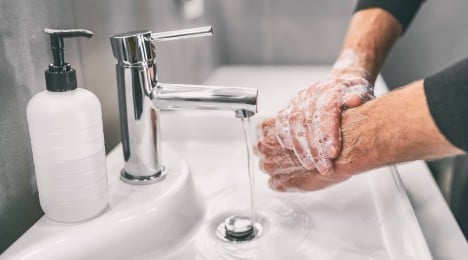You want to ensure you are knowledgeable about (and using!) the best bacteria-killing techniques, whether it's cold and flu season or simply another day in a world full of germs. To keep yourself and your family and community safe, an essential practice you must engage in is hand washing.
How Do Germs Spread¹?
You can stay healthy and stop the spread of respiratory and diarrheal illnesses by washing your hands frequently. Individuals can contract germs from surfaces or other people when you:
When unwashed hands touch your mouth, nose, or eyes.
When unwashed hands, prepare or consume food and beverages.
Sneeze, cough, or blow your nose into your hands before touching other people’s hands or everyday objects.
When Should I Wash My Hands Using Hand Wash?
Washing your hands frequently will help you and those you care about stay healthy, especially during these times when you are most likely to pick up and spread germs:
Prior to, during, and after meal preparation
Both before and after a meal
Before and after providing at-home medical care for a sick person who is vomiting or having diarrhea
Before and after a cut or wound has been treated
Following a bathroom visit
After performing diaper changes for your little one
After sneezing, coughing, or blowing your nose
After coming into contact with animal manure or animal feed
Following using pet treats or food
After handling trash
How Long Should You Wash Your Hands?
The general rule of thumb is that you wash your hands thoroughly with hand wash for at least 20 seconds. To ensure that the time spent is accurate, many suggest you hum the “Happy Birthday” song twice.
Steps on How to Wash Hands
One of the simplest and most reliable ways to stop the spread of germs is to wash your hands. Maintaining clean hands can help prevent the transmission of germs across our communities, including your home, place of employment, schools, and childcare facilities.
Step 1 - Wet your hands with clean, cold or warm running water. Turn the faucet off when you are done.
Step 2 - Rub an antibacterial hand wash, such as JOHNSON'S ANTI-BACTERIAL MICELLAR HAND WASH LEMON or JOHNSON'S ANTI-BACTERIAL MICELLAR HAND WASH MINT, on your hands to create a lather.
Step 3: Make sure the soap reaches soap beneath your nails, between your fingers, and on the backs of your hands.
Step 4: Turn on the faucet. Wash your hands thoroughly with running water that is clean.
Step 5: Dry your hands with a fresh towel or let them air dry. Turn the faucet off with a paper towel. Do not touch the faucet again with your bare hands.
What is the Best Hand Wash to Use?
To ensure that your hand washing routine is combating even the most stubborn germs and bacteria, you need to opt for an anti-bacterial hand wash.
Clinical testing has shown that JOHNSON's Anti-Bacterial Micellar Hand Wash effectively kills germs without damaging your skin. Its product uses micellar technology, which attracts and removes germs like a magnet while yet respecting your skin's natural barrier of defense. JOHNSON'S Antibacterial Micellar Hand Wash guards against dryness by trapping moisture thanks to its moisturizing agent enrichment.
Keep your skin hydrated, clean, and fresh with JOHNSON’S wide selection of antibacterial hand washes with different long-lasting and highly germ-combating fragrances.

